人教版(PEP)小学英语小升初期末总复习课件(共29张PPT)
文档属性
| 名称 | 人教版(PEP)小学英语小升初期末总复习课件(共29张PPT) | 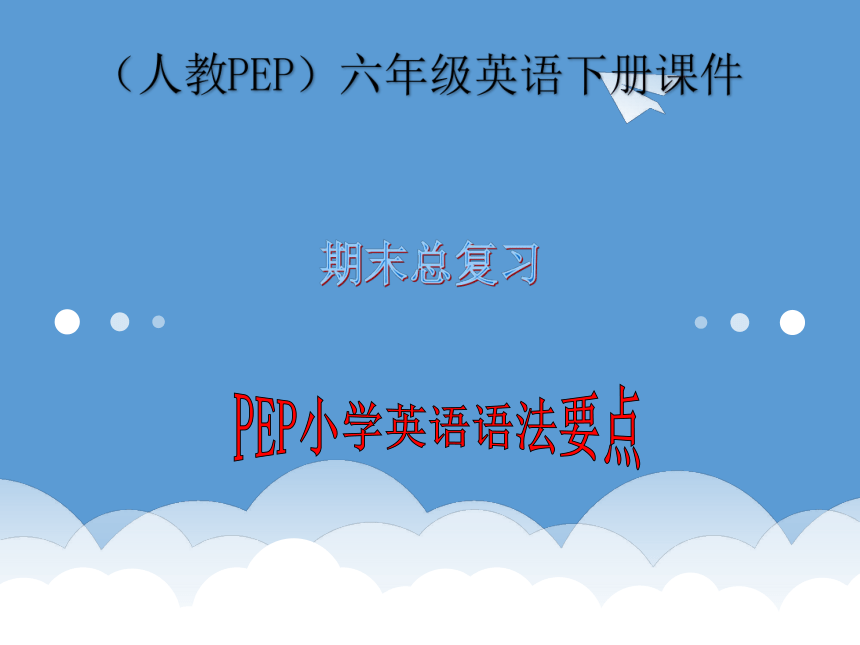 | |
| 格式 | zip | ||
| 文件大小 | 385.9KB | ||
| 资源类型 | 教案 | ||
| 版本资源 | 人教版(PEP) | ||
| 科目 | 英语 | ||
| 更新时间 | 2019-04-16 13:49:42 | ||
图片预览


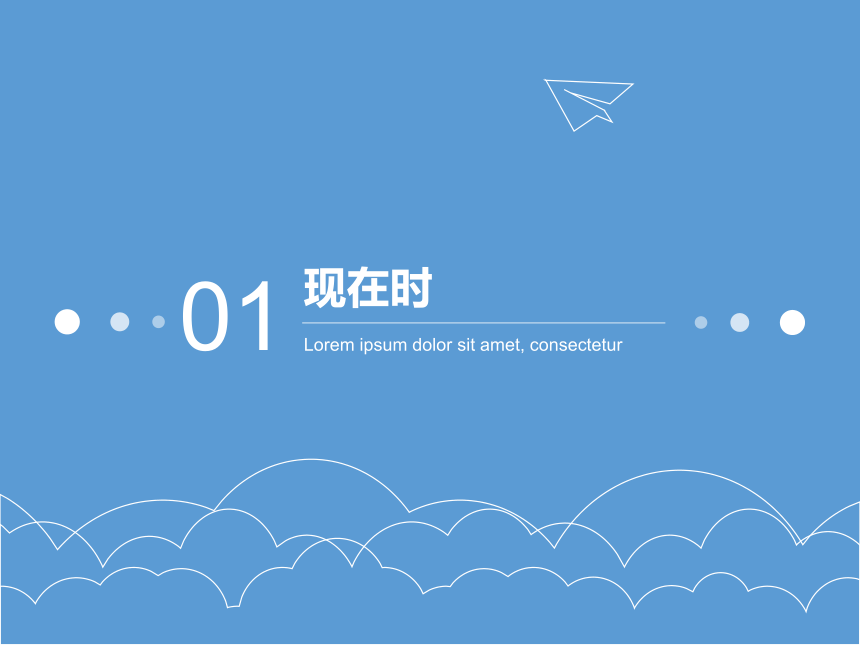
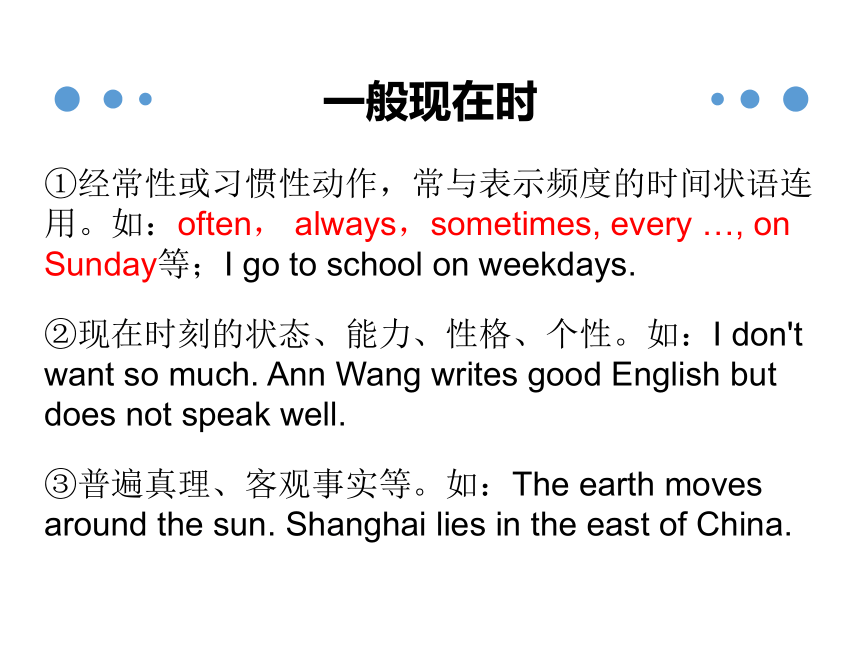
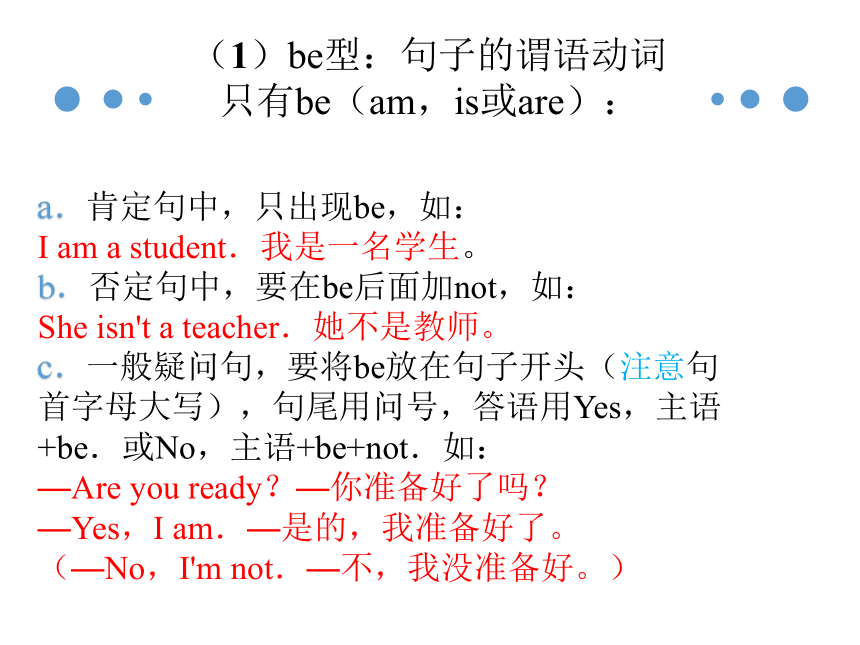
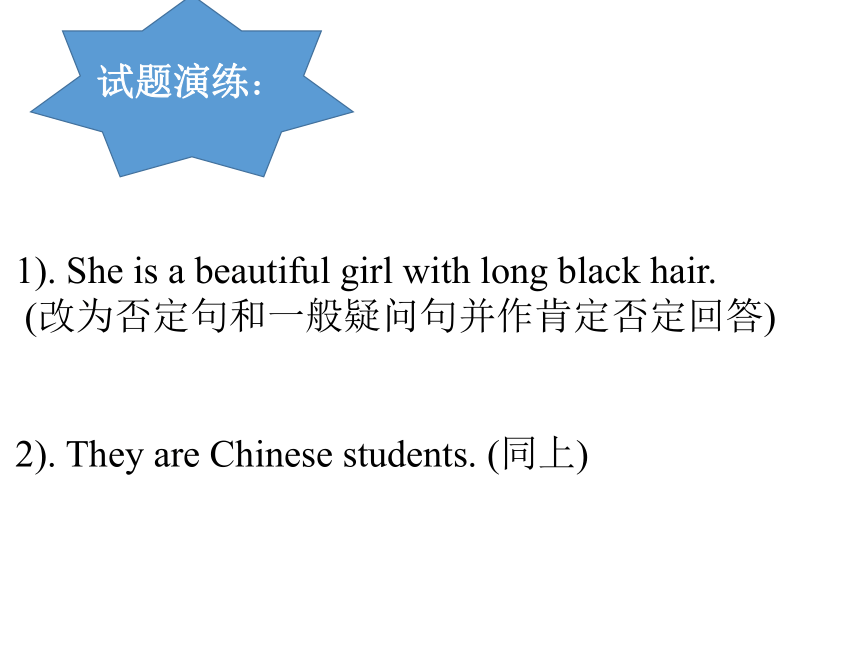
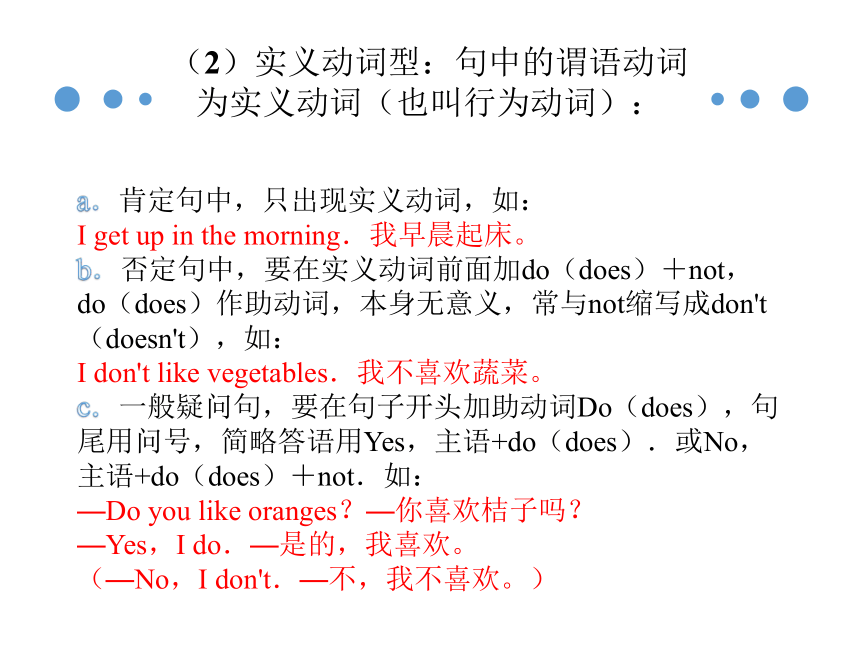
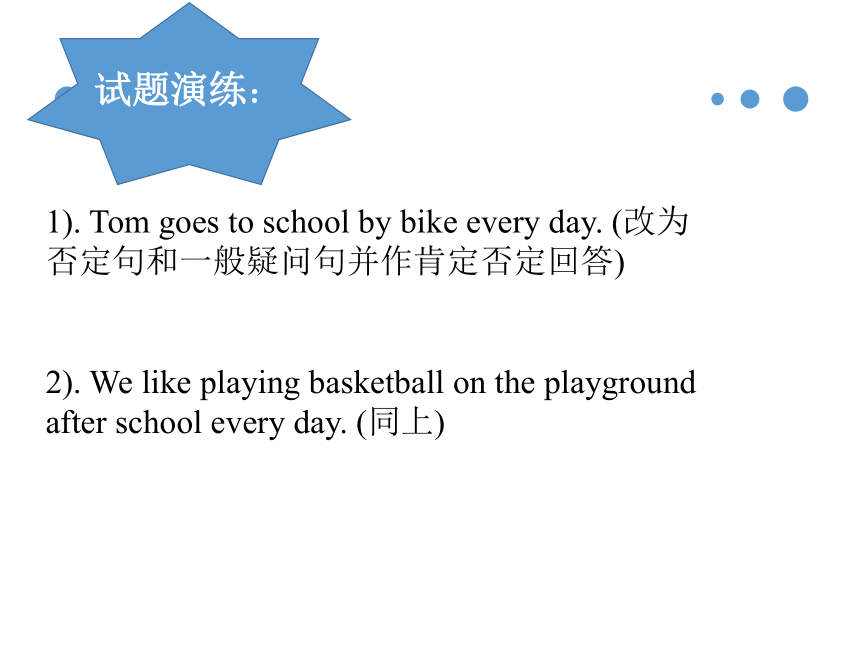
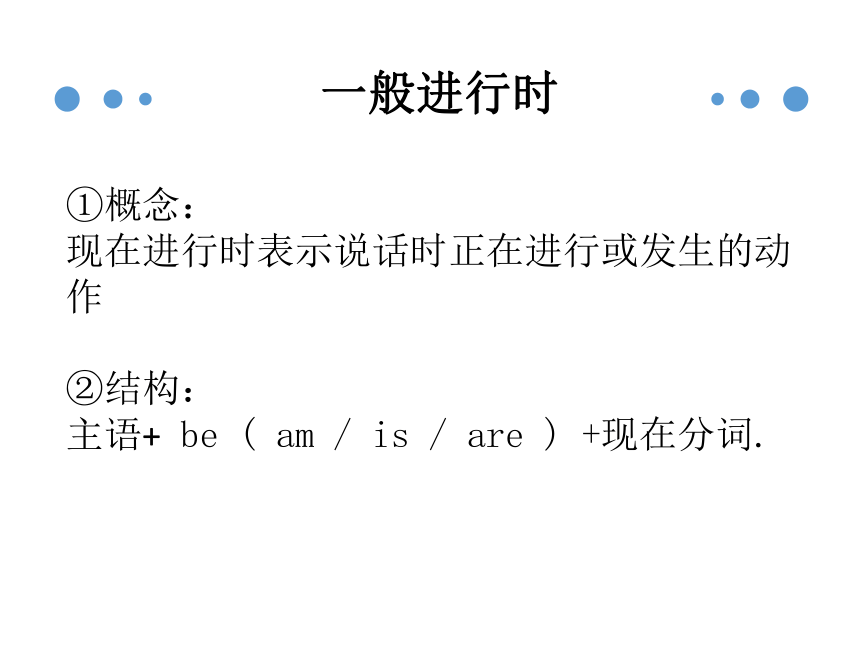
文档简介
课件29张PPT。(人教PEP)六年级英语下册课件期末总复习PEP小学英语语法要点概述1.一般现在时
2.一般现在进行时
3.一般过去时
4.一般将来时小学时态现在时Lorem ipsum dolor sit amet, consectetur01一般现在时①经常性或习惯性动作,常与表示频度的时间状语连用。如:often, always,sometimes, every …, on Sunday等;I go to school on weekdays.
②现在时刻的状态、能力、性格、个性。如:I don't want so much. Ann Wang writes good English but does not speak well.
③普遍真理、客观事实等。如:The earth moves around the sun. Shanghai lies in the east of China.(1)be型:句子的谓语动词
只有be(am,is或are):
a.肯定句中,只出现be,如:
I am a student.我是一名学生。
b.否定句中,要在be后面加not,如:
She isn't a teacher.她不是教师。
c.一般疑问句,要将be放在句子开头(注意句首字母大写),句尾用问号,答语用Yes,主语+be.或No,主语+be+not.如:
—Are you ready?—你准备好了吗?
—Yes,I am.—是的,我准备好了。
(—No,I'm not.—不,我没准备好。)
1). She is a beautiful girl with long black hair.
(改为否定句和一般疑问句并作肯定否定回答)
2). They are Chinese students. (同上)试题演练:(2)实义动词型:句中的谓语动词为实义动词(也叫行为动词):
a.肯定句中,只出现实义动词,如:
I get up in the morning.我早晨起床。
b.否定句中,要在实义动词前面加do(does)+not,do(does)作助动词,本身无意义,常与not缩写成don't(doesn't),如:
I don't like vegetables.我不喜欢蔬菜。
c.一般疑问句,要在句子开头加助动词Do(does),句尾用问号,简略答语用Yes,主语+do(does).或No,主语+do(does)+not.如:
—Do you like oranges?—你喜欢桔子吗?
—Yes,I do.—是的,我喜欢。
(—No,I don't.—不,我不喜欢。)1). Tom goes to school by bike every day. (改为否定句和一般疑问句并作肯定否定回答)
2). We like playing basketball on the playground after school every day. (同上)试题演练:一般进行时①概念:
现在进行时表示说话时正在进行或发生的动作
②结构:
主语+ be ( am / is / are ) +现在分词.1.大多数动词后可在动词后直接加- ing.
Eg: carry-carrying, catch-catching, drink-drinking
2. 如果动词以-e结尾,则去掉-e,再加- ing,
如come-coming , have-having , make-making, ride-riding, write-writing, take-taking, use-using
3. 如果动词只有一个元音字母,而其后跟有一个辅音字母时,将此辅音字母双写,再加-ing
如: hit-hitting, let-letting,
put-putting,run-running,
sit-sitting.现在分词构成句型结构:
1.现在进行时的肯定形式、否定形式、疑问形式及其回答,所有变化都体现在助动词 be ( is / am / are ) 上.
1)现在进行时的肯定形式:
主语+be(am/ is/are)+doing+其他成分
I am singing . They are writing .
2)现在进行时的否定形式:
主语+be(am/ is/are)+not +doing+其他成分
I am not singing . They aren’t writing .3)一般疑问句及回答:
be(am/ is/are)+ 主语+doing+其他成分
Am I singing ?
Yes ,you are . / No ,you aren’t .
Are they writing ?
Yes ,they are . / No ,they aren’t .
4)特殊疑问句及回答:
特殊疑问词+be(am/ is/are)+主语+doing+其他成分
What are you doing ? We are playing
2. 缩写形式如下:
I am---I’m You are---You’re He is---He’s 试题演练:1. ____you___ (fly) a kite? Yes,_______.
2. ______you_____ (sit) in the boat?
3. ______he________ (talk) with me?
4. We__________ (play) football now.
5. What_________you__________(do)?AreflyingAresittingIstalkingplayingaredoingthey are试题演练:1. Look. Lucy is_____ a new bike today.
A. jumping B. running C. riding D taking
2. The children _____ football.
A. is playing B. are playing
C. play the D. play a
3. They ______TV in the evening. They do their homework.
A. are watching B. can’t watching
C. don’t watch D. don’t watchingCBA过去时Lorem ipsum dolor sit amet, consectetur02一般过去时表示在过去某个时间里所发生的动作或存在的状态。通常在句子里找到表示过去时间的词或词组。
①如:yesterday,the day before yesterday(前天),
last night/week/ month/year,
just now(刚才),two days ago,
a week ago,in 1990等。
②如:I went to bed at eleven last night.
昨晚我11:00睡觉。动词一般过去时变化规则1.一般在动词末尾加-ed,
如:pull-pulled, cook-cooked, play- played
2.结尾是e加d,如:taste-tasted
3.末尾只有一个元音字母和一个辅音字母的重读闭音节,应双写末尾的辅音字母,再加-ed,
如:stop-stopped,plan-planned,
prefer-preferred
4.以“辅音字母+y”结尾的,变y为i,再加-ed,
如:study-studied
am/is→was are→were have/has→had
do→did sing→sang sit→sa
give→gave run→ran come→came
eat→ate take→took write→wrote
小学阶段不规则动词一般过去时句式变化(1) Be动词在一般过去时中的变化
① am 和is在一般过去时中变为was。
(was not=wasn’t)
② are在一般过去时中变为were。
(were not=weren’t)
③ 带有was或were的句子,其否定、疑问的变化和is, am, are一样,即否定句在was或were后加not,一般疑问句把was或were调到句首。(2)句中没有be动词的一般过去时的句子
Jim does homework every day.
Jim did homework yesterday.
否定句: Jim did homework yesterday.
Jim didn't do homework yesterday. (didn't +动词原形)
一般疑问句: Jim did homework yesterday.LOREM IPSUM DOLOR
Did Jim do homework yesterday? (在句首加did,句子中的动词过去式变回原形)
特殊疑问句: Jim did homework yesterday.
Did Jim do homework yesterday?
What did Jim do yesterday? (疑问词+一般疑问句?)Lorem ipsum dolor sit amet, consectetur adipisicing elit, sed do eiusmod tempor incididunt ut labore一、写出下列动词的过去式或动词原形。
1. go_______ 2. is___________
3.buy_______ 4.swim__________
5. have ____ 6. watched _____
7. ate______ 8. got__________ 试题演练:wentwasboughtswamhadwatcheatget试题演练:二、 用单词的适当形式填空。
1. ________ you ________(water) the flowers yesterday.
2. Su Hai _________(go) for a walk last Sunday.
3. Mike didn’t ________(finish) his homework yesterday.
4. I _______ (pick) apples on the tree last month.
5. I _______(is) ten years old last year.
On that day, I _______(blow) the candles out.Didwaterwentfinishpickedwasblow试题演练:三、 选择正确的答案。
1. I ____ presents for my parents yesterday.
A. buyed B. bought C. buying
2. Susan _____ swimming yesterday.
A. go B. goes C. went
3. Danny _____ breakfast five times last week.
A. eat B. ate C. eated
4. Last Sunday____ Tree Planting Day.
A. is B. were C. was BCBC将来时理论一、? 概念:表示将要发生的动作或存在的状态及打算、计划或准备做某事。
句中一般有以下时间状语:
tomorrow, next day(week, month, year…),
soon, the day after tomorrow(后天)
this morning , this afternoon , this evening等。 基本结构①be going to + do;
1.Wuyifan is going to visit his grandparents next weekend .
2.Amy is going to climb mountains tomorrow.
②will+ do.
1.He will go shopping this afternoon.
2.He will go to shanghai next month .一、按要求填空
1. 我打算明天和朋友去野炊。
I_____ _______ _________ have a picnic with my friends.
I ________ have a picnic with my friends.
2. 下个星期一你打算去干嘛? 我想去打篮球。 What ________ ________ _________ _________ _________ next Monday?
I _______ ______ _____ play basketball.
What _________ you do next Monday?
I ________ play basketball. 试题演练:amgoingtowillareyougoingtodoamgoingtowillwill二、改句子。
5. Nancy is going to go camping.(改否定)
Nancy ________ going to go camping.
6. I’ll go and join them.(改否定)
I _______ go ______ join them.
7. I’m going to get up at 6:30 tomorrow.(改一般疑问句)
________ _______ ________ to get up at 6:30 tomorrow? 试题演练:isn'twon'torAreyou going谢谢观看THANK YOU
2.一般现在进行时
3.一般过去时
4.一般将来时小学时态现在时Lorem ipsum dolor sit amet, consectetur01一般现在时①经常性或习惯性动作,常与表示频度的时间状语连用。如:often, always,sometimes, every …, on Sunday等;I go to school on weekdays.
②现在时刻的状态、能力、性格、个性。如:I don't want so much. Ann Wang writes good English but does not speak well.
③普遍真理、客观事实等。如:The earth moves around the sun. Shanghai lies in the east of China.(1)be型:句子的谓语动词
只有be(am,is或are):
a.肯定句中,只出现be,如:
I am a student.我是一名学生。
b.否定句中,要在be后面加not,如:
She isn't a teacher.她不是教师。
c.一般疑问句,要将be放在句子开头(注意句首字母大写),句尾用问号,答语用Yes,主语+be.或No,主语+be+not.如:
—Are you ready?—你准备好了吗?
—Yes,I am.—是的,我准备好了。
(—No,I'm not.—不,我没准备好。)
1). She is a beautiful girl with long black hair.
(改为否定句和一般疑问句并作肯定否定回答)
2). They are Chinese students. (同上)试题演练:(2)实义动词型:句中的谓语动词为实义动词(也叫行为动词):
a.肯定句中,只出现实义动词,如:
I get up in the morning.我早晨起床。
b.否定句中,要在实义动词前面加do(does)+not,do(does)作助动词,本身无意义,常与not缩写成don't(doesn't),如:
I don't like vegetables.我不喜欢蔬菜。
c.一般疑问句,要在句子开头加助动词Do(does),句尾用问号,简略答语用Yes,主语+do(does).或No,主语+do(does)+not.如:
—Do you like oranges?—你喜欢桔子吗?
—Yes,I do.—是的,我喜欢。
(—No,I don't.—不,我不喜欢。)1). Tom goes to school by bike every day. (改为否定句和一般疑问句并作肯定否定回答)
2). We like playing basketball on the playground after school every day. (同上)试题演练:一般进行时①概念:
现在进行时表示说话时正在进行或发生的动作
②结构:
主语+ be ( am / is / are ) +现在分词.1.大多数动词后可在动词后直接加- ing.
Eg: carry-carrying, catch-catching, drink-drinking
2. 如果动词以-e结尾,则去掉-e,再加- ing,
如come-coming , have-having , make-making, ride-riding, write-writing, take-taking, use-using
3. 如果动词只有一个元音字母,而其后跟有一个辅音字母时,将此辅音字母双写,再加-ing
如: hit-hitting, let-letting,
put-putting,run-running,
sit-sitting.现在分词构成句型结构:
1.现在进行时的肯定形式、否定形式、疑问形式及其回答,所有变化都体现在助动词 be ( is / am / are ) 上.
1)现在进行时的肯定形式:
主语+be(am/ is/are)+doing+其他成分
I am singing . They are writing .
2)现在进行时的否定形式:
主语+be(am/ is/are)+not +doing+其他成分
I am not singing . They aren’t writing .3)一般疑问句及回答:
be(am/ is/are)+ 主语+doing+其他成分
Am I singing ?
Yes ,you are . / No ,you aren’t .
Are they writing ?
Yes ,they are . / No ,they aren’t .
4)特殊疑问句及回答:
特殊疑问词+be(am/ is/are)+主语+doing+其他成分
What are you doing ? We are playing
2. 缩写形式如下:
I am---I’m You are---You’re He is---He’s 试题演练:1. ____you___ (fly) a kite? Yes,_______.
2. ______you_____ (sit) in the boat?
3. ______he________ (talk) with me?
4. We__________ (play) football now.
5. What_________you__________(do)?AreflyingAresittingIstalkingplayingaredoingthey are试题演练:1. Look. Lucy is_____ a new bike today.
A. jumping B. running C. riding D taking
2. The children _____ football.
A. is playing B. are playing
C. play the D. play a
3. They ______TV in the evening. They do their homework.
A. are watching B. can’t watching
C. don’t watch D. don’t watchingCBA过去时Lorem ipsum dolor sit amet, consectetur02一般过去时表示在过去某个时间里所发生的动作或存在的状态。通常在句子里找到表示过去时间的词或词组。
①如:yesterday,the day before yesterday(前天),
last night/week/ month/year,
just now(刚才),two days ago,
a week ago,in 1990等。
②如:I went to bed at eleven last night.
昨晚我11:00睡觉。动词一般过去时变化规则1.一般在动词末尾加-ed,
如:pull-pulled, cook-cooked, play- played
2.结尾是e加d,如:taste-tasted
3.末尾只有一个元音字母和一个辅音字母的重读闭音节,应双写末尾的辅音字母,再加-ed,
如:stop-stopped,plan-planned,
prefer-preferred
4.以“辅音字母+y”结尾的,变y为i,再加-ed,
如:study-studied
am/is→was are→were have/has→had
do→did sing→sang sit→sa
give→gave run→ran come→came
eat→ate take→took write→wrote
小学阶段不规则动词一般过去时句式变化(1) Be动词在一般过去时中的变化
① am 和is在一般过去时中变为was。
(was not=wasn’t)
② are在一般过去时中变为were。
(were not=weren’t)
③ 带有was或were的句子,其否定、疑问的变化和is, am, are一样,即否定句在was或were后加not,一般疑问句把was或were调到句首。(2)句中没有be动词的一般过去时的句子
Jim does homework every day.
Jim did homework yesterday.
否定句: Jim did homework yesterday.
Jim didn't do homework yesterday. (didn't +动词原形)
一般疑问句: Jim did homework yesterday.LOREM IPSUM DOLOR
Did Jim do homework yesterday? (在句首加did,句子中的动词过去式变回原形)
特殊疑问句: Jim did homework yesterday.
Did Jim do homework yesterday?
What did Jim do yesterday? (疑问词+一般疑问句?)Lorem ipsum dolor sit amet, consectetur adipisicing elit, sed do eiusmod tempor incididunt ut labore一、写出下列动词的过去式或动词原形。
1. go_______ 2. is___________
3.buy_______ 4.swim__________
5. have ____ 6. watched _____
7. ate______ 8. got__________ 试题演练:wentwasboughtswamhadwatcheatget试题演练:二、 用单词的适当形式填空。
1. ________ you ________(water) the flowers yesterday.
2. Su Hai _________(go) for a walk last Sunday.
3. Mike didn’t ________(finish) his homework yesterday.
4. I _______ (pick) apples on the tree last month.
5. I _______(is) ten years old last year.
On that day, I _______(blow) the candles out.Didwaterwentfinishpickedwasblow试题演练:三、 选择正确的答案。
1. I ____ presents for my parents yesterday.
A. buyed B. bought C. buying
2. Susan _____ swimming yesterday.
A. go B. goes C. went
3. Danny _____ breakfast five times last week.
A. eat B. ate C. eated
4. Last Sunday____ Tree Planting Day.
A. is B. were C. was BCBC将来时理论一、? 概念:表示将要发生的动作或存在的状态及打算、计划或准备做某事。
句中一般有以下时间状语:
tomorrow, next day(week, month, year…),
soon, the day after tomorrow(后天)
this morning , this afternoon , this evening等。 基本结构①be going to + do;
1.Wuyifan is going to visit his grandparents next weekend .
2.Amy is going to climb mountains tomorrow.
②will+ do.
1.He will go shopping this afternoon.
2.He will go to shanghai next month .一、按要求填空
1. 我打算明天和朋友去野炊。
I_____ _______ _________ have a picnic with my friends.
I ________ have a picnic with my friends.
2. 下个星期一你打算去干嘛? 我想去打篮球。 What ________ ________ _________ _________ _________ next Monday?
I _______ ______ _____ play basketball.
What _________ you do next Monday?
I ________ play basketball. 试题演练:amgoingtowillareyougoingtodoamgoingtowillwill二、改句子。
5. Nancy is going to go camping.(改否定)
Nancy ________ going to go camping.
6. I’ll go and join them.(改否定)
I _______ go ______ join them.
7. I’m going to get up at 6:30 tomorrow.(改一般疑问句)
________ _______ ________ to get up at 6:30 tomorrow? 试题演练:isn'twon'torAreyou going谢谢观看THANK YOU
